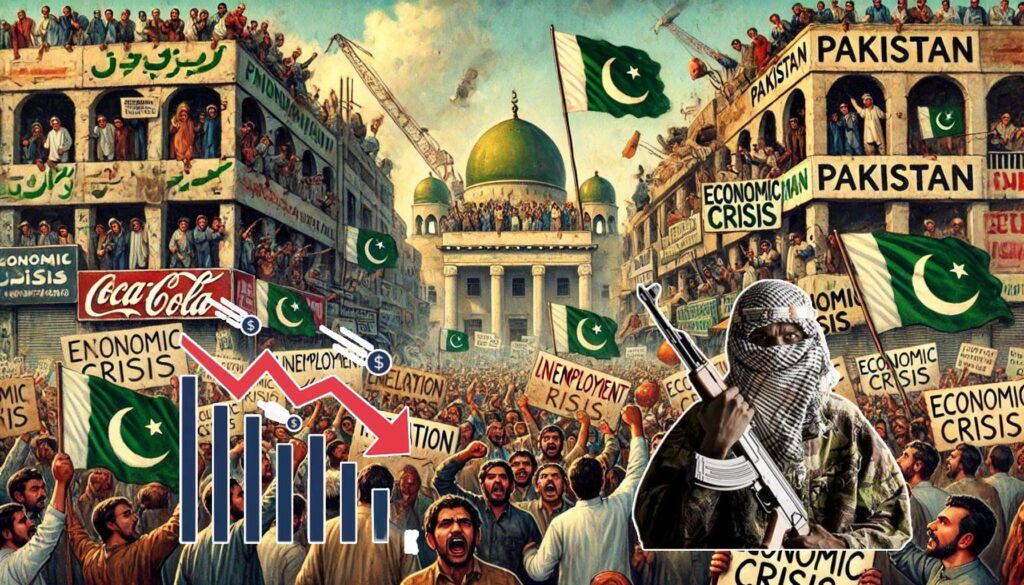
- Political unrest in Pakistan intensifies as PTI supporters protest the arrest of KP Chief Minister Ali Amin Gandapur ahead of the SCO summit
- Pakistan’s internal turmoil, including widespread protests, raises questions about its ability to handle domestic issues while still fixated on Kashmir
- At the UNGA 2024, PM Shehbaz Sharif criticized India’s actions in Jammu and Kashmir, comparing it to Palestine, which India strongly refuted
- Amid economic and political instability, Pakistan’s focus on Kashmir seems misguided, raising concerns about its governance priorities
Ahead of the upcoming Shanghai Cooperation Organisation (SCO) Summit scheduled for October 15-16 in Islamabad. A huge explosion on 6th October close to Pakistan’s Jinnah International Airport in Karachi reported several casualties and the political unrest in Pakistan is becoming worse as Imran Khan’s PTI followers are holding rallies in Islamabad and have shared a video of security personnel detaining Khyber Pakhtunkhwa Chief Minister Ali Amin Gandapur after they entered KP House. Widespread protests have been ignited by his arrest, with PTI supporters swarming D-Chowk in Islamabad, blocking important routes, and grappling with police.
Former and Jailed PM Imran Khan’s PTI supporters are demonstrating against Gandapur’s detention and demanding his release. Overnight, the protest intensified as protesters attempted to reach the city via the Islamabad-Peshawar highway but were thwarted by the use of tear gas. In order to manage the swarming throng, police blockades were erected and mobile internet was shut down.
Meanwhile, Mohsin Naqvi, the interior minister of Pakistan, claimed that more than 80 police officers had been wounded in the fights and blamed the PTI for orchestrating protests in order to thwart the forthcoming SCO Summit. Before the foreign diplomatic engagements, which will be attended by delegations from China, Russia, and India, Naqvi had urged the PTI to immediately end their protests.
However, despite these cautions, PTI also scheduled a separate event in Lahore, which led to lockdowns on significant routes. Notwithstanding the PTI’s insistence that the Islamabad demonstration will be short, tensions are still high as the party keeps opposing government officials in the face of a wider political movement. Considering the 23rd meeting of the Council of Heads of Government of the SCO and the participation of VVIP delegations, these disruptions may continue past October 7.
Struggle at Own Homeland, Obsessing Over Kashmir
At UNGA 2024, Pakistani Prime Minister Shehbaz Sharif in his speech, juxtaposed the situation of the people of Jammu and Kashmir to that of Palestine and charged that India had failed to meet its responsibilities in the region. According to Sharif, the people of Jammu and Kashmir have been striving for their freedom and right to independence for more than a century, just like the Palestinians. Following the invalidation of Article 370 in August 2019, he denounced India’s actions and asserted that New Delhi was enhancing its military capabilities mainly for targeting Islamabad. He didn’t stop here furthermore, he called on India to stop its unilateral actions in Kashmir and start a conversation based on decisions from the UN Security Council in order to find a peaceful solution.

In addition, Sharif falsely accused India of “thoughtlessly” rejecting Pakistani suggestions for strategic caution and vowed that Pakistan would retaliate forcefully against any Indian aggression. He repeated Pakistan’s position that the “final solution” in Jammu and Kashmir remained the objective of India’s actions after August 2019, including the revocation of Article 370.
In response to these absurd claims, India fiercely admonished Pakistan at the UN General Assembly, calling its efforts to bring up the issue of Jammu and Kashmir a “travesty.” Bhavika Mangalanandan, First Secretary at India’s Permanent Mission to the UN, denounced Pakistan’s “hypocrisy” for challenging the electoral process in Jammu and Kashmir during India’s Right to Reply at the 79th Session of the UNGA. India criticised Pakistan’s continuous manipulation of international platforms to divert focus from its own domestic shortcomings and emphasised the country’s insolence in attacking it despite facing internal difficulties.
In accordance with theories of international relations, Pakistan’s internal turmoil makes it more difficult for it to legitimately demand Kashmir from India. Based on realism, which places a strong emphasis on state sovereignty and security, Pakistan’s ability to project power abroad is weakened by its political unrest and security issues. Liberalism emphasizes how Pakistan’s credibility is harmed by internal unrest, which impedes international collaboration and support for its Kashmir claim. Meanwhile, India’s stature in the world is strengthened by its relative stability. Moreover, constructivism contends that Pakistan’s domestic problems damage its reputation as a responsible nation.
Whereas, the prolonged job crisis, political instability, and the Pakistani government’s inability to control its economy are evidence of its failings. The leadership, however, is still obsessed with Kashmir despite these urgent problems. If they can’t even handle their own internal problems, it raises the question of how well they can run the region. Do they actually care for the people of Kashmir, or is this just a showoff? On the other hand, India, a secular country, keeps encouraging its people to grow and flourish. It is advisable that Prime Minister Sharif should stop pretending to care about Kashmir and instead focus on solving Pakistan’s internal issues. It is time for him to put his own nation’s well-being ahead of outside concerns.
(Anjali Singh is a Postgraduate political science and international relations student and a former ICWA research intern.)
Anjali Singh is a postgraduate student of Political Science and International Relations, a Social Media Analyst, and a former Research Intern at the Indian Council of World Affairs. Views expressed are the author’s own.
